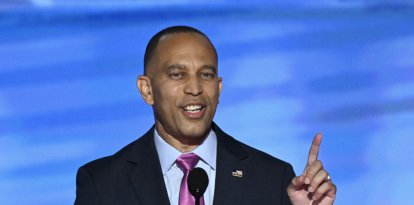'The Amazon Files': House Judiciary Committee assures that the company censored 43 books at the request of the Biden administration
Republican Jim Jordan said the latest revelations are just "the tip of the iceberg" of a government campaign against the First Amendment.

(Cordon Press)
Representative Jim Jordan claimed, in a new installment of "The Amazon Files," that the technology company censored numerous books linked to vaccines during March 2021 at the request of the Biden administration. These included some children's books, others for parents and some more critical of large pharmaceutical companies, as detailed.
As the chairman of the House Judiciary Committee announced in previous installments of "The Amazon Files," the company created a new category called "Do Not Promote" at the request of the administration. In a series of posts on X, Jordan shared for the first time the titles of the 43 books that received this label:
One of the books, he explained, was aimed at children who suffered discrimination for not being vaccinated. "The author said the book 'promotes love, understanding, and kindness to everyone,'" the Republican commented. "Biden and Amazon preach 'tolerance.' Right?"
Another post talks about one of the books for parents: "The Vaccine Book: Making the Right Decision for Your Child" by Dr. Robert W. Sears. It claims to offer information about various diseases and vaccines so that parents can make a more informed decision, and clarifies that it does not replace a consultation with a doctor.
"There is nothing the Biden Admin and the elites hate more than parents making their own decisions about their children’s education, health, and values," Jordan said. He also added that "if these efforts weren’t enough to effectively deamplify opposing viewpoints," scientific articles were also included in the new category:
The 'censorship-industrial complex'
Jordan maintained that the latest internal emails obtained through subpoenas from the committee he heads are just "the tip of the iceberg." Amazon, YouTube and Facebook, he maintained, all bowed to "the Biden White House’s censorship campaign."
He also refuted the argument that the government had simply undertaken a campaign against disinformation on the internet: "This is—and always has been—about suppressing disfavored views, not purported challenges of new technologies."
The representative also promised that the House Judiciary Committee and the Weaponization Committee will continue to investigate what they called "the censorship-industrial complex." This campaign of Democratic coercion, they say, led Meta, Alphabet and Amazon to change their content moderation policies. In effect, it censored books, videos and posts online.
This government initiative violated the First Amendment, both committees said in a report last month in which they compile the information collected about the different companies.
Furthermore, they claim that it ended up silencing truthful and other non-verifiable information, such as satire, memes, opinions and personal experiences. They also assert that it had an impact on the response to the pandemic:
"America needs to have free and open debate on the pressing issues of the day," added the report, which also vowed to promote laws to prevent this type of behavior. "The Biden Administration should have trusted the intelligence of the American people to make up their own minds."
'The Twitter Files'
The first indication of this pressure from public officials was given by Elon Musk after acquiring Twitter, now called X. The South African tycoon brought to light internal company documents that showed the inner workings of its content moderation policies.

























